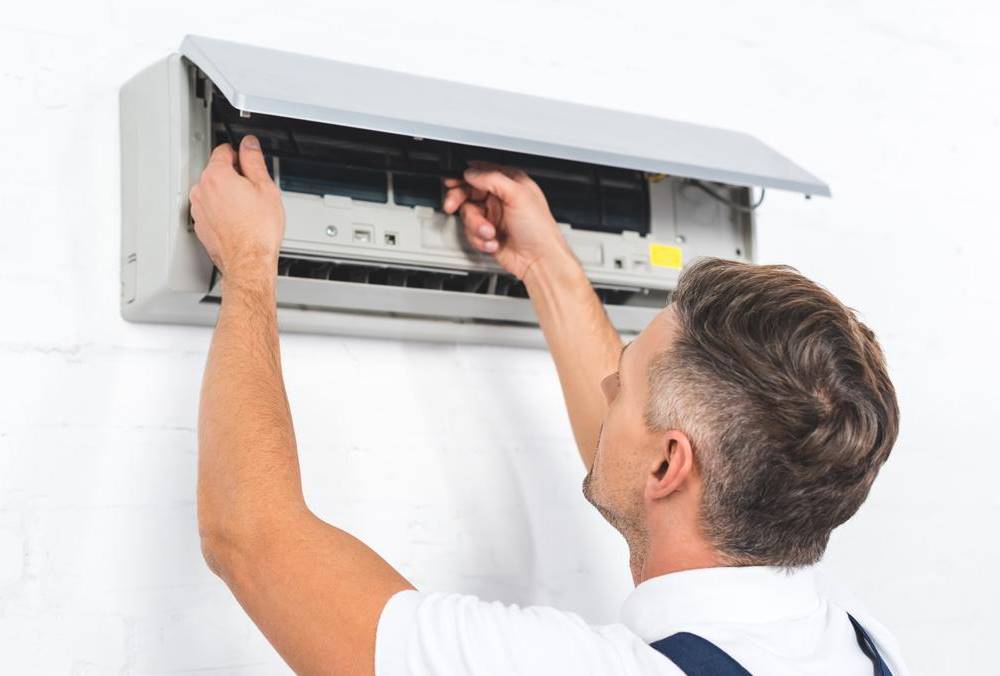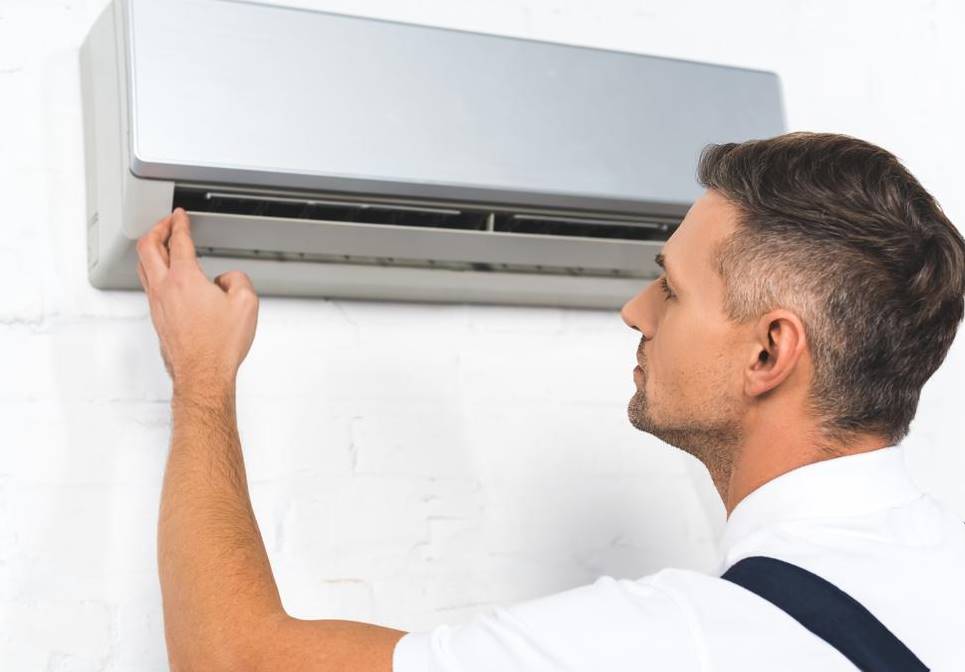Is there anything better than entering a cold, air-conditioned room on a hot summer day? I highly doubt it! You can trust your air conditioner to save the day in the summer, but it needs some maintenance. Preparing your air conditioner for the various seasons is easy with the knowledge you'll get from this article on seasonal maintenance. There is no flowery language here; simply straightforward tips for staying calm under pressure.
The Importance of Seasonal Upkeep
The summer is to an air conditioner what the holiday shopping season is to a store clerk. It's the most stressful time of the year, and you'll need months to prepare. If you are paying attention to your air conditioner and know that you need to prepare it ahead of time to get the most out of it, then you are halfway there.
Let's talk about how important air conditioning maintenance is before we go into the nuts and bolts of it. Maintenance of your air conditioner at the beginning of each cooling season is as important as getting an oil change for your automobile. Avoiding maintenance can prevent problems, save money on energy costs, and limit cooling capacity.
The Importance of Preventative Maintenance
Preventive maintenance is the way to go if you want your air conditioner to work properly this summer.
Some individuals find preventive maintenance a godsend because it can be difficult to track when they last cleaned the filter in their air conditioner or when they will need to do so again. Even if they knew what to look for, most homeowners would feel uncomfortable opening their air conditioner to inspect it for potential issues.
Preventive maintenance can help your unit work more efficiently and have fewer breakdowns, saving you time, money, and energy. Prioritising scheduling preventive maintenance for your air conditioner before the summer heats up is the surest approach to prolong the life of your cooling system.
Some Preparation Work for Your Air Conditioner This Summer
In addition to performing regular preventative maintenance, there are a few things you can do to create a comfortable environment for your air conditioner, allowing it to operate more efficiently.
Obtaining All Of The Necessary Equipment
A hose, screwdriver, fin comb/brush, vacuum cleaner with soft brush attachment, and a replacement air filter, if necessary, are the minimum equipment and supplies required to get started. If you have these on hand, things will go quickly and easily.
Switch Off The Lights
Before performing any AC maintenance, you must disconnect the power to your unit. Your air conditioner's switch can be found in your home's main breaker box or a separate box in the outside wall close to your HVAC system.
For around 30 minutes, let the device sit with the power off. This will allow the capacitor's stored energy to dissipate over time. DIY maintenance typically involves avoiding contact with electrical components.
Switch To A New Filter
Get the outside of your air conditioner in order first. Clear the area around the appliance of any loose objects, such as branches, leaves, or grass clippings. Remove any overgrown bushes or trees to improve ventilation.
Filters in your HVAC system should be cleaned or replaced regularly. This needs to be done periodically throughout the year, like every few months or so, whenever the filters start looking dusty or clogged. This is crucial in ensuring that your home is supplied with unobstructed, filtered air. Any obstruction to the free air movement around your HVAC system will force it to work harder, increasing your monthly energy costs and the risk of a breakdown.
Cleaning The Exterior
After lying idle during the winter, your air conditioner is probably filthy. This dirt can block airflow and should be removed, especially from the coils.
First, make sure the area around the device is clear. Get rid of leaves, weeds, and anything else that could cause a blockage in airflow. The exterior coils should be cleaned after the concrete base is clear. The unit's outside can be cleaned with a garden hose. Consider using an air conditioner cleaner if the buildup is thick. Outside AC coil cleaning improves efficiency, lowers utility bills, and improves air quality.
Please turn off the AC's power before spraying or wiping it down.
Make Sure That Your Interior Is Clean
For optimal performance, clean your air conditioner. Inside air conditioners should be checked first. You should turn off the AC system's circuit breaker to prevent an electrical fire or harm.
Take off the cover of the air conditioner's control panel. The evaporator coils should be the first thing you focus on. Your evaporator coil may become clogged with dirt and other particles over time. Foaming cleansers formulated for the coil are recommended. The debris will tumble into the drain as the foamy cleaner does.
The drain pan and drain pipe should be cleaned next. Both of these parts are susceptible to obstruction from hard water and debris. Both of these AC parts should be given a good cleaning with a solution of bleach and water. If you do this, there is less chance of water backing up in the pipes or drains.
What Should I Do If I Discover A Coolant Leak?
The refrigerant in your unit is what causes the temperature to drop. Make sure there are no leaks in the refrigerant lines and that all of the connections are tight. A specialist should be contacted if a leak is suspected.
Condenser Coils And Evaporator Cleaning And Inspection
An air conditioner with dirty coils will not cool as well. Take off the cover to inspect the coils. If they get dirty, use a soft brush or the brush attachment on a vacuum to clean them carefully.
Correction Of The Fins
Airflow is disrupted if the condenser's fins are twisted. Carefully straighten them with a fin comb or flathead screwdriver. Brush, wipe, or vacuum the fins and fan blades clean. Take care not to scuff the fins as you do so. The use of a hose might help remove stubborn stains and mud. Again, be careful not to damage the parts by misusing the spray. Do not spray any electrical components or the fan motor, nor should you flood the device. Put a trash bag over these areas to prevent this from happening.
Taking Care Of The Condensate Drain
Algae and other debris can accumulate in the condensate drain, making it ineffective. Get rid of any mould or water buildup by clearing out the area. A solution of water and bleach can aid in maintaining visibility.
Is It Okay If I Don't Clean The Fins And Coils?
Not recommending it at all. Air conditioners with dirty coils and bent fins must work harder, which might diminish their lifespan.
Checking Your Air Conditioner After Repairs
When you're done, you can test your air conditioner by turning the power back on. Verify that it is cooling properly and making no strange noises.
Start the AC and leave it on while you watch for any strange activity, suggesting HVAC repair is needed. The air flowing from the vents should be cool and steady, so check them. Repair your air conditioner immediately if it isn't functioning properly; otherwise, small issues could snowball into costly ones.
Set A Comfortable Temperature And Maintain It
When you've settled on a comfortable temperature for your home, don't change the thermostat. If you continuously alter the thermostat, your air conditioner will have to work more than necessary to maintain the desired temperature.
Just because it's hot outside doesn't mean you should turn down the air conditioning by 30 degrees. Your air conditioner will be overworked if you do this. The air conditioner won't have to do anything out of the ordinary to maintain the temperature you set.
The moment has come to sit down and set your thermostat to the appropriate temperatures throughout the day. When going home, consider keeping the temperature at 78 degrees. Set the thermostat to 88 degrees when you know you won't be home, such as at work. In this way, you can rest assured that your air conditioner uses its energy wisely.
Steps for Additional Do-It-Yourself AC Maintenance
Additional methods will help your air conditioner run efficiently and minimise your monthly power bill.
Check The Concrete Slab For Unevenness.
If the slab is not level, the air conditioner must work more. The slab should be levelled if it has shifted during the winter.
Inspect The Condensation Line.
If this is clogged, your device could be damaged. Find the drain and make sure it's working.
The Insulation Of Your Coolant Lines Should Be Checked.
Foam insulation will most likely be placed over these coolant lines. This insulation must be in satisfactory condition and cover the lines entirely to prevent heat loss. Replace the insulation if you detect any holes or cracks in it.
Have No Fear!
Regular seasonal maintenance is essential to the health and efficiency of your air conditioner. By taking care of your air conditioner in this way, you can keep your home cool and comfortable, reduce your energy bill, and avoid expensive repairs.
Investing a little time to prepare your air conditioner for seasonal maintenance will pay dividends later. It will keep you cool in the summer and help your air conditioner last longer. Put away your worries this summer by grabbing your tools and following these easy instructions.
Conclusion
Prepare your air conditioner for seasonal maintenance with these advice. It emphasises regular maintenance to prevent issues, save energy, and limit cooling capacity. Preventative maintenance is essential for air conditioner performance and lifetime. To prepare, you need a hose, screwdriver, fin comb/brush, vacuum cleaner, and replacement air filter.
Let your unit sit without power for 30 minutes to complete maintenance. Clean around the appliance and replace the filter. For clear air, clean or replace filters regularly. Clean your air conditioner's exterior, especially the coils, to boost performance, cut power expenses, and improve air quality.
These tips will help your air conditioner run more efficiently, saving you time, money, and energy. Turn off the AC before cleaning or wiping.
Clean your air conditioner completely for best efficiency. Prevent electrical fires by turning off the AC circuit breaker. To avoid blockage, use foamy cleaners on the evaporator coils, drain pan, and drain pipe. Contact a technician to tighten connections and avoid water back-up if you find a coolant leak.
Check coils and evaporator with a soft brush or vacuum. Straighten fan blades and fins to maintain airflow. For visibility, clean the condensate drain with water and bleach.
After repairs, restart the air conditioner and look for unusual activity. Air conditioner repair soon if needed. Maintain a comfortable temperature of 78 degrees at home and 88 degrees away throughout the day.
Other DIY AC repair procedures include checking the concrete slab for unevenness, condensation line, and coolant line insulation. Good foam insulation should cover lines to avoid heat loss. Cracks or holes in insulation should be replaced.
Regular seasonal maintenance keeps your air conditioner healthy, lowers your energy bill, and prevents costly repairs. Preparing your air conditioner for periodic maintenance will keep you comfortable in summer and increase its longevity.
Content Summary
- Changing the oil in your car is analogous to changing the oil in your air conditioner; both require regular maintenance.
- Your air conditioner is better able to bear the strain of the heat if you perform maintenance on it seasonally.
- It is possible that preventative maintenance will result in fewer breakdowns, which will save you both time and money.
- Airflow that is clean and unobstructed can be maintained with regular filter cleaning or replacement.
- Before beginning the maintenance on the unit, make sure that the outside has been thoroughly cleaned.
- In order to avoid any potential electrical mishaps, make sure that your air conditioner is unplugged.
- It is essential for the safety of the device that the energy stored in the capacitor be allowed to dissipate.
- After the surrounding area has been cleared, you should clean the exterior coils of the unit.
- When dealing with tenacious buildup, you might want to consider using an air conditioner cleaner.
- When cleaning the interior, particular attention must be paid to the evaporator coils and the drains.
- Problems with water backup can be avoided by keeping the drain pan and pipe clean.
- Performing routine maintenance can help reduce the risk of expensive coolant leaks.
- The effectiveness of your air conditioner's cooling ability can be diminished by dirty coils.
- Condenser fins that have been bent should be carefully straightened to optimise airflow.
- It is vital, in order to avoid clogs, to clean the condensate drain of any debris and mould that may be present.Keeping up with the maintenance of your air conditioner is absolutely necessary to ensure your comfort during the dog days of summer.
- Maintaining your air conditioner on a seasonal basis is essential to ensuring that it functions effectively.
- In addition to preventing problems and saving money on energy expenditures, regular maintenance is important.
- It is imperative that you undertake preventative maintenance on your air conditioner in order to ensure its performance.
- In order to maintain unrestricted airflow, filters need to be cleaned or replaced on a regular basis.
- It is imperative that the exterior of the unit be cleaned in order to achieve optimal performance.
- To protect against any electrical dangers during maintenance, the power will be turned off.
- ensuring that there is no obstruction in the region around the unit so that it can properly breathe.
- To improve energy efficiency, clean the external coils of the unit using a hose or other cleaning agent.
- Evaporator coils and drains are maintained as part of the interior cleaning process.
- Repairing leaks in coolant systems requires the expertise of a trained professional.
- A decrease in cooling efficiency may be the result of dirty coils.
- In order to improve the flow of air through the condenser, straighten out the curved fins.
- Fins, fan blades, and other components need to be cleaned with extreme care to prevent damage.
- It is vital to clean the condensate drain and remove any dirt and mould that may be present.
- Your air conditioner's lifespan may be shortened if you do not keep the coils and fins clean.
- After completing maintenance on your air conditioner, you should check that it still functions properly.
- You should try to keep the temperature on your thermostat constant.
- Altering the temperature on your thermostat too frequently causes it to work harder.
- Adjust the temperature on your thermostat to one that uses the least amount of energy.
- DIY projects that need additional upkeep include verifying the levelness of the concrete slab.
- In order to avoid any damage, you should check the condensation line for obstructions.
- Inspect the insulation on the coolant lines, and if necessary, replace it.
- Regular maintenance keeps your air conditioner running efficiently and might cut down on your monthly energy expenditures.
- It is important to spend the time necessary to prepare your air conditioner before using it.
Frequently Asked Questions About Air Condition
Seasonal maintenance is crucial because it ensures your air conditioner runs efficiently, reducing energy consumption and preventing potential breakdowns. It also extends the lifespan of your AC unit, saving you money in the long run.
You should clean or replace your air filter every few months or when it appears dusty or clogged. Regular filter maintenance ensures proper airflow and cleaner indoor air.
While some maintenance tasks, like cleaning or changing filters, can be done by homeowners, it's advisable to have a professional perform a comprehensive maintenance check at least once a year. They can identify and address potential issues that may go unnoticed.
Neglecting seasonal maintenance can lead to reduced cooling efficiency, increased energy costs, and a higher risk of breakdowns, especially during hot summer months. It may also shorten the lifespan of your AC unit and result in expensive repairs.
Yes, turning off the power to your air conditioner before conducting any maintenance to avoid electrical hazards is crucial. You can find the AC's power switch in your home's main breaker box or an outside box near the HVAC system. Allow the capacitor's stored energy to dissipate by keeping it powered off for around 30 minutes before beginning maintenance.



